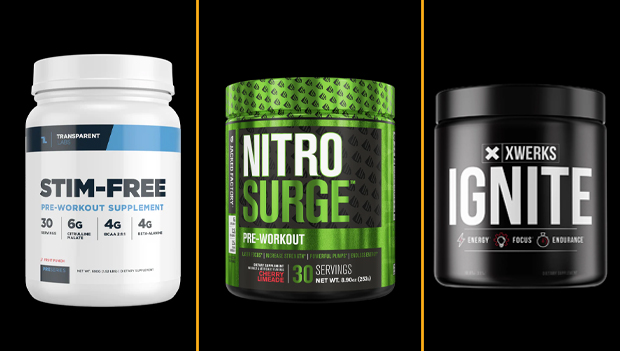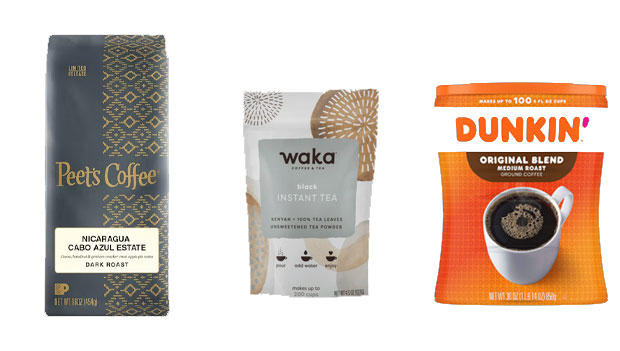
By clicking on the product links in this article, we may receive a commission fee at no cost to you, the reader. Sponsorships and affiliate commissions help support our research so we can help you find the best products. Read the full affiliate disclosure here.
Coffee vs. Pre-Workout
I work out in the evenings. But after a long day of work and chauffeuring my teenager, I’m often moving at a sloth-like pace and find myself reaching for a boost to power me through. Enter: coffee. My love for coffee is borderline problematic. It is always what I think of first when I need a quick jolt of caffeine. However, more often than not, I end up reaching for pre-workout before…umm, my workout.
So in the coffee versus pre-workout battle, which one reigns supreme? In this review, I’ll break down the pros and cons of the new upstart—pre-workout—versus coffee, the seasoned veteran. As you read on and decide for yourself which is better, here are our recommendations of our favorite pre-workouts, and coffee:
Our Favorite Pre-Workouts:
Our Favorite Coffee
- For Wellness High-Antioxidant Organic Ground Coffee
- Bulletproof Original Ground Coffee
- Life Boost Dark Roast Coffee
- Waka Medium Roast Instant Coffee
Pre-Workout

Unlike coffee, pre-workout does not have centuries of history behind it, but it does have a fairly fervent fanbase. Pre-workout or Multi-Ingredient Pre-Workout Supplements (MIPS), if you would like to maintain a formal relationship, were developed about 40 years ago. It has become increasingly popular in the past decade.
Most pre-workouts contain caffeine, but you can find some that are non-caffeinated and still offer an energy boost. Where pre-workouts differ from coffee is that in addition to caffeine, they also contain amino acids, beta-alanine, creatine, nitric oxide, and precursors. These nutrients not only increase muscular and cardiovascular during exercise, but they may also promote recovery after your workout is finished.
What We Like
- May improve athletic performance
- Increases muscular and cardiovascular endurance
- Comes in a variety of flavors
What We Don’t Like
- Beta-alanine may cause tingling sensations or itchiness
- Can cause anxiety and sleeplessness
Benefits of Pre-Workout
Considering that pre-workout comes in a variety of flavors, those who don’t like the taste of coffee may find it easier to mix up their favorite caffeine choice with some cool water. In addition to appeasing your palate, the additional nutrients that are found in pre-workouts not only positively influence your muscles and cardiovascular systems, but they may also boost your mood. Furthermore, if you like to totally avoid caffeine, you can find some pre-workouts that will energize you without the use of caffeine.
Cons of Pre-Workout
Not only can the caffeine in pre-workout cause sleeplessness and anxiety, but beta-alanine may cause tingling sensations. While it is generally thought to be harmless, it can be annoying and worrisome. Additionally, since many pre-workouts include creatine, you may find that you are retaining more water and experiencing some digestive discomfort. It’s also worth mentioning that one of the amino acids found in pre-workout, citrulline, increases blood flow to your muscles. While this is beneficial to many of your muscles, it can have adverse effects on the small blood vessels in your brain which can lead to headaches.
Can coffee be a substitute for pre-workout?
If you are looking for a boost before your workout, you can certainly drink a cup of coffee to provide a caffeine bump. However, while coffee contains plenty of caffeine and antioxidants that can be helpful for your workouts, it doesn’t have many of the nutrients that are found in pre-workout. Therefore, it’s up to you to decide what is best for you and your workout regimen.
Coffee

Although the exact origins of coffee have never been confirmed, one of the legends about its discovery states that an Ethiopian goat herder noticed after eating the berries of a certain tree, his goats became so energetic that they wouldn’t go to sleep.
People have been following in the hoof-steps of those Ethiopian goats for centuries by turning to coffee for energy. This includes brewing the beans for a boost before we tackle an exhausting workout.
And although caffeine’s exact effects on athletic performance aren’t fully understood, according to a study, it is generally accepted that small amounts of caffeine can enhance endurance and muscular strength when consumed in the correct amounts. Additionally, it can increase alertness and decrease the onset of fatigue.
What We Like
- Includes antioxidants
- May improve physical endurance
- Potentially increase amount of fat burned
What We Don’t Like
- Can cause sleeplessness and anxiousness
- May upset your stomach
Benefits of Coffee
Sipping (or guzzling, if that is your jam) a cup of coffee before a workout can not only give you a little pep in your step, but it can also help improve your muscular endurance, cardiovascular stamina, and overall strength. Caffeine can also make you more mentally alert. Although often overshadowed by caffeine, coffee also contains powerful antioxidants. These provide protection against oxidative stress that can cause premature aging and various diseases.
Cons of Coffee
Coffee can cause an upset stomach, and that is one of the last issues that anyone wants to deal with before they work out. Although the caffeine in coffee will give you a boost of energy, it may also cause anxiety and lead to sleepless nights. Consuming too much coffee, in rare instances, can also lead to caffeine toxicity or a caffeine overdose.
Final Verdict on Coffee vs. Pre-Workout
When it comes to coffee vs pre-workout it mainly depends on personal preference. If you want a little jump start to your workout, try out both and see what works best for you. In addition to caffeine, pre-workout has some nutrients that may be beneficial during and after your workout. However, some of these nutrients may have adverse effects such as tingling, headaches, and even weight gain. Both coffee and pre-workout may upset your stomach.
Why Trust Us?
The health and safety of ACTIVE’s readers is of the utmost importance to us. To ensure your well-being when consuming nutritional supplements, the ACTIVE.com editorial team prioritizes products that are independently tested by a third-party. We’ve also consulted with a team of nutritionists and dieticians to ensure the products we feature are of the highest standard. This helps us create the most accurate, authentic review content for our readers.
FAQs About Coffee vs. Pre-Workout
Is it better to drink coffee or pre-workout?
Both coffee and pre-workout can give you a boost of energy. This is because both usually contain caffeine. However, pre-workout, unlike coffee, contains beneficial amino acids. These amino acids help keep muscle fatigue at bay while increasing blood flow.
Can I drink pre-workout instead of coffee?
If you prefer the taste of pre-workout to coffee, you can drink it instead of coffee. However, most pre-workout has considerably more caffeine than coffee, and it also contains nutrients that decrease muscle fatigue and increase blood flow. Therefore, if you choose pre-workout instead of coffee and don’t plan to work out soon after consumption, you should take the added caffeine and amino acids into consideration.
How much coffee is equivalent to pre-workout?
The amount of caffeine in pre-workout varies depending on the brand, but in general, each serving contains 150-300 mg of caffeine. This is three to four times the amount of caffeine typically found in a cup of coffee.
Does pre-workout wear off faster than coffee?
There is generally more caffeine in pre-workout than coffee. Most of the other ingredients in pre-workout will remain in your body for four-six hours. However, you will most likely only feel the effects for around half that time. The caffeine that you consume with a cup of coffee will take around half an hour to be felt and 60-90 minutes for it to reach its peak.
These statements have not been evaluated by the Food and Drug Administration. This product is not intended to diagnose, treat, cure, or prevent any disease.


